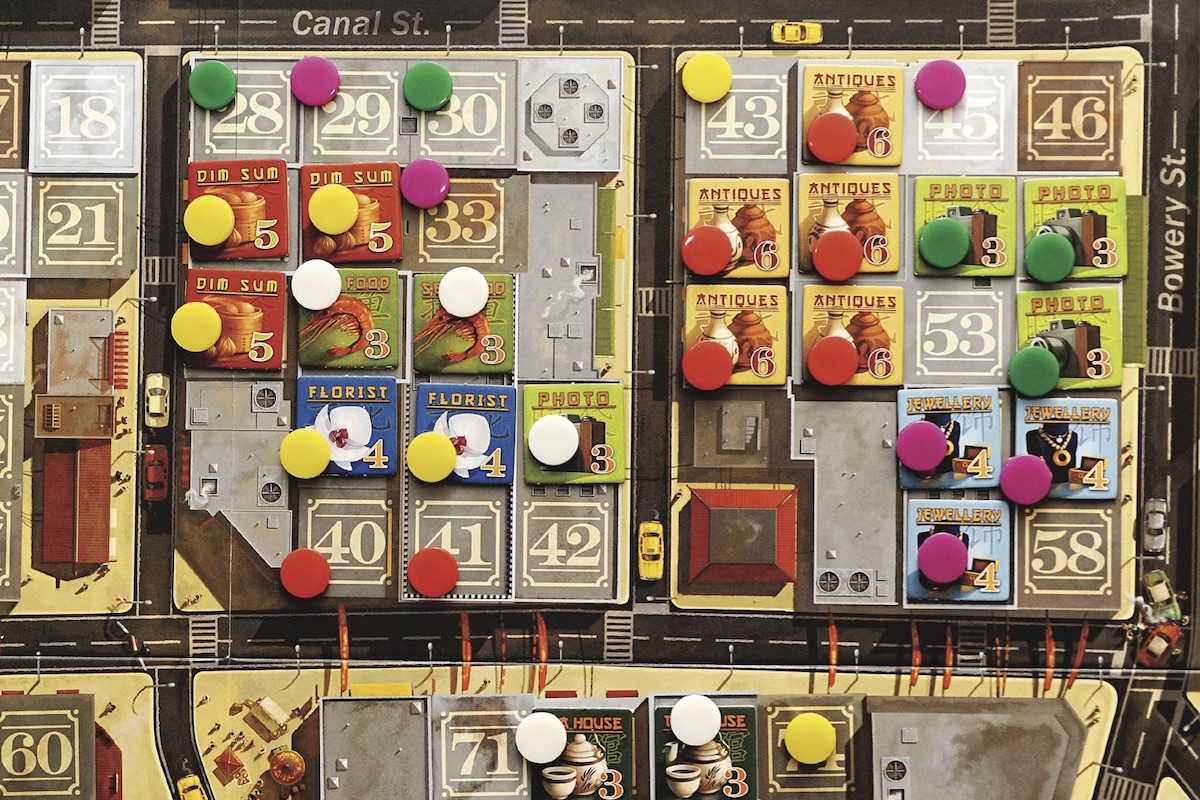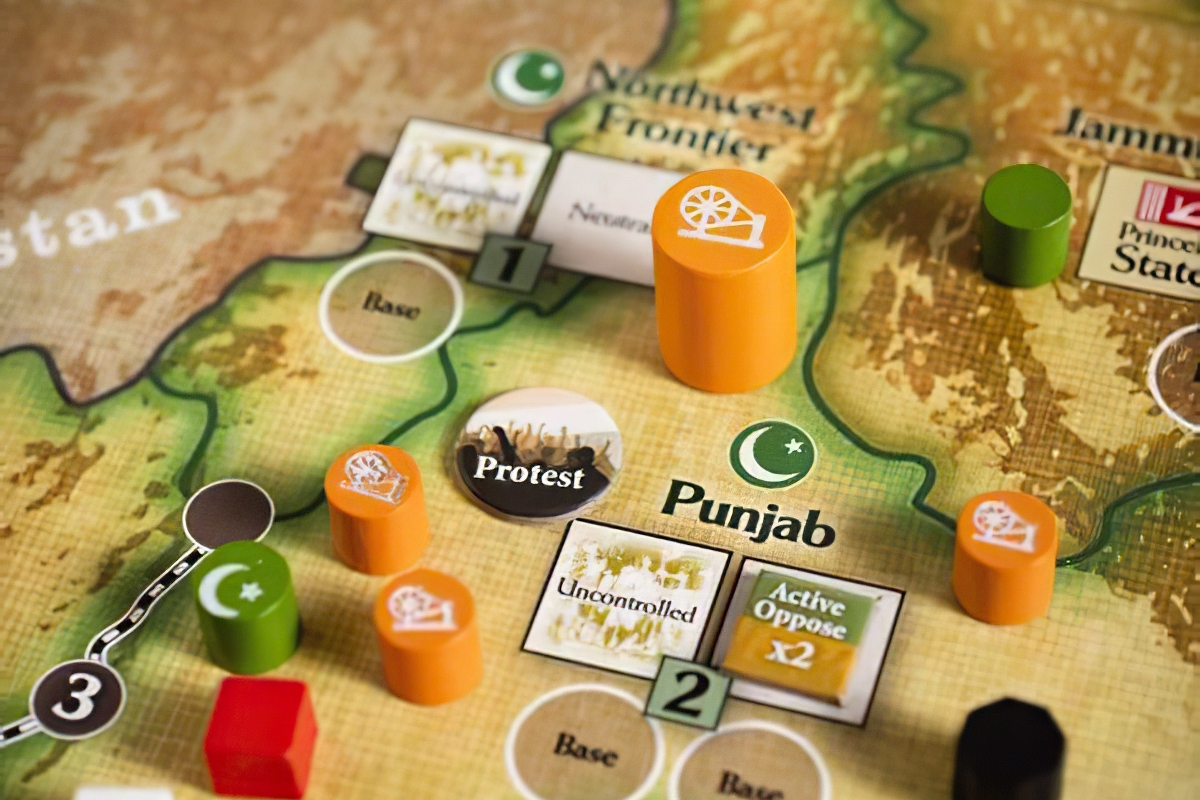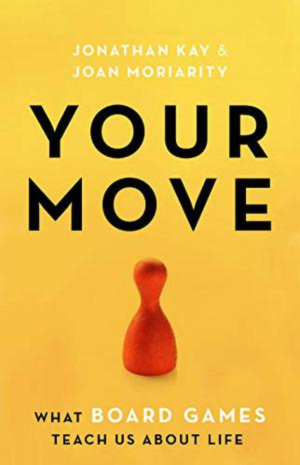Top Stories
How Boardgames Teach the Limits of Rationalism
The drive to deal with other players is embedded in the scoring rules, which emphasize economies of scale.

For gamers who love the art of the deal, but don’t want to waste precious gaming time rolling dice and pushing tokens around a Monopoly board, Chinatown is the perfect choice. In this real-estate-themed game, created in the late 1990s by German designer Karsten Hartwig, properties are distributed to players randomly at the beginning of every turn. The bulk of the game consists of pure negotiation.
While the properties in Monopoly are named after streets in Atlantic City, Chinatown takes its inspiration from the early days of New York City’s Chinese commercial area near Canal Street. The Chinatown playing surface looks something like a giant chessboard, and each player (the fun is maximized with five people) use assigned chessboard squares to erect little cardboard flower shops, restaurants, tea houses, laundromats and other street-level retail businesses.
The drive to deal with other players is embedded in the scoring rules, which emphasize economies of scale. Tiny businesses that cover only one or two board squares don’t earn a lot of points (even when calculated on a per-square basis), while big bonuses are awarded for expanded businesses that sprawl over four, five or six contiguous squares. Players typically start the game with scattered, isolated properties, then consolidate their holdings into big, connected blocs in order to maximize scoring.
The opening layout of a player’s properties typically dictates her deal flow. For instance, if I have a growing tea house in one sector of the map, and you own a single, unused square that is adjacent to my tea business, it will make sense for you to sell me that single rump square so that I can build more tea-house seating and score big points, assuming I am willing to pay you a decent price.
Or we may trade properties. Instead of me paying you money for your unused square, I might offer you another rump square that I own in another area of the map, close to your main hub—which may, for instance, allow you to add more washers and dryers to a growing laundromat. There is always going to be a market-clearing price for this kind of transaction, because orphaned squares always generate a lot more revenue once they are tacked on to an existing business.
In this way, Chinatown is a sort of extended case study in the purest form of microeconomic decision-making. All players are out to maximize their own profits, and the costs and benefits are transparent. The game shows how, in this kind of perfect world, capitalism can make everyone richer.
That exchange of properties described in the paragraphs above, for instance, might be analogized to the real-world case of two collectors who each own incomplete sets of formal dishware. If Collector A has seven place settings of Wedgwood China in a Charnwood pattern, and one setting in Florentine Turquoise; while Collector B has seven place settings of Florentine Turquoise and one of Charnwood, then it makes both collectors better off if Collector B gives up the rump Charnwood setting in exchange for Collector A’s rump Florentine Turquoise, thereby generating two complete sets of eight (which are, as any collector knows, apt to fetch a much higher price than incomplete sets of seven). Indeed, if these collectors were not somehow able to reach terms on such a mutually profitable deal, one might conclude that at least one of them was irrational.
And yet, human nature being what it is, this sort of irrational actor does sometimes pop up. I know this to be true because sometimes that irrational actor is me.
As I recall, it was 2016, and I was playing a five-player game of Chinatown with some neighborhood friends, including an avid gamer by the name of John Chew. The game was unfolding in the typical Chinatown way, and the lay of the land clearly suggested that John and I would soon be making a deal. In one corner of the board, John had an antiques shop that he could expand if he acquired my neighboring rump property, while elsewhere on the board, I had a florist that could be expanded to its full capacity if John sold me his two adjoining unused squares. The deal looked promising and fair for both of us. While John would be giving me two squares, and I would be giving him only one, his fully built-out antiques shop would generate roughly double the revenue of my built-out flower business.
But then John did something startling. He started an entirely new business on one of the two squares that I coveted, an irreversible move (the game rules do not permit businesses to be removed once they are placed on the board) that massively lowered my expected value in any prospective deal. To revert to the dishware example described above, it was as if John had taken a teacup that I coveted as part of an impending deal, and permanently repurposed it as a paper-clip holder.
John calmly assured me that the deal still was a good idea for both of us. Yes, it was true, John acknowledged, that he would now be giving me less than I had originally wanted. But since I would still be making some extra revenue on the deal, and since John was the only player who had any interest in buying my rump property, the deal still should make sense for me. Put another way, he had me over a barrel. In economic terms, he was operating within a “monopsony,” a market in which there is effectively only one buyer. With no one else having any reason to buy what I had to sell, my best play was to swallow my pride and sell out to John, even though he had deliberately tanked the price I would be receiving.
In purely microeconomic terms, John’s argument was flawless. And I clearly remember thinking that accepting this diminished deal was the rational thing to do. Yet as I began handing over the property token, something in me rebelled against the situation. It grated on me that John would be benefiting from behavior that I regarded as opportunistic and cynical. So I balked.
At this point, I should point out that, to my knowledge, I am generally known among other gamers as a reasonably good sport. I like to win. I am competitive and sometimes mope around a bit if on a losing streak. But I never yell or throw an out-and-out hissy fit when things do not go my way. So my peevish decision to reject John’s deal was out of character. What’s worse, it arguably put me outside the “magic circle” that my co-author Joan Moriarity describes in the introductory chapter of our new book, Your Move: What Board Games Teach Us About Life—the virtual boundary that divides the world of play from the concerns of real life. As a gamer, I pride myself on being a dispassionate analyst who knows how to play the odds. What was it about this situation that made me abandon the cut-and-dry tools of cost-benefit analysis?
The implications of this question go beyond the world of games. Microeconomics is built around rational—choice theory, which presumes that economic actors will consistently act in such a way as to maximize the value they receive in any transaction. But at that gaming moment, Rational Choice Theory left the building, even when John specifically appealed to its precepts.
Since the early 1980s, social scientists have talked about something the Ultimatum Game. It’s not a recreational game in the sense of Chinatown, but rather a game in the sense of game theory, an academic field that applies mathematical models to describe and test the way people make real-life decisions.
The Ultimatum Game involves two strangers, one of whom is designated as “the proposer,” and the other as “the responder.” The researcher conducting the Ultimatum Game will offer the proposer a gift (e.g., one hundred dollars in cash) that must be shared with the responder. The proposer then decides how to split up the gift, and informs the responder of the proposed division of spoils. If the responder accepts the split, then both participants receive their assigned portion. But if the responder rejects the split, neither player receives anything. In either case, the proposer and responder never learn one another’s identity.

In a purely rational world, it would not matter how the proposer divided the gift. So long as the receiver gets something out of the deal, she should always accept what is offered—even if it’s as lopsided as ninety-nine dollars for the proposer, and one dollar for the receiver (since a single dollar is better than nothing). But what researchers consistently found is that responders often will reject proposed splits that are highly lopsided. Most responders are okay with splitting the money 60/40, and possibly even 70/30. But once the ratio becomes higher than that, responders often balk. What’s more, proposers seem to anticipate this “irrational” behavior among responders, as studies show that the average proposed split in Ultimatum Game trials is about 60/40.
Ultimatum Game experiments conducted around the world show that this sort of behavior is exhibited universally among men, women, poor, rich, young and old. It also transcends cultural differences. When one set of researchers conducted the Ultimatum Game in Jerusalem, Ljubljana, Pittsburgh and Tokyo, for instance, they got roughly similar results.
So what explains the irrational-seeming impulses of Ultimatum-Game participants? There are many theories, but several clues emerge from follow-up experiments in which researchers tinkered with the rules. In the 1990s, for instance, Gary Bolton and Rami Zwick created something called the Impunity Game. In this variation of the Ultimatum Game, the responder retains the right to accept or reject the proposed division of spoils—but this decision does not affect the proposer, who always will retain the amount that she originally apportioned to herself. For example, if a proposer offers a responder just ten dollars out of a hundred-dollar sum, then the proposer would keep her ninety-dollar portion, regardless of whether the responder agreed to accept her ten-dollar allotment.
The results were stark. Unlike in the Ultimatum Game, responders in the Impunity Game were willing to accept even the most meagre payout. Bolton and Zwick had hypothesized that Ultimatum Game responders might be rejecting small payouts because accepting them might serve to diminish their dignity in front of the researchers conducting the experiment. But results from the Impunity Game suggest that Ultimatum Game responders who leave money on the table are motivated primarily by a desire to punish a proposer’s “unfair” offer—a reflex that some might classify as spite.
The question then becomes this: Why are humans so eager to punish anonymous individuals for their perceived greed? Even if the proposer in an Ultimatum Game truly does learn a life lesson about equity and social justice from a responder’s decision to punish him for a lowball offer, how does that benefit the responder? (Remember: In these games, the participants are strangers to one another.)
The answer seems rooted in evolutionary psychology. While most of us now live in cities full of strangers, our primate brains emerged in an ancestral environment where we existed in small, tight-knit kin groups. Even as recently as a few centuries ago, most European peasants lived their whole lives in farming communities populated by just a few dozen families. In such environments, where everyone knows everyone, community members tend to deal harshly with behavior deemed disruptive or anti-social, to help ensure that it does not happen again. Even today, the idea of punishment and retribution comes naturally to us, and explains how mobs are so easily stirred to acts of vengeance following a shocking crime.
At the same time, none of us want to be viewed by our peers as a sucker who can be exploited by others, the economic equivalent of cuckoldry. Imagine a peasant farmer who is offered pennies on the pound for her crops. One can understand why she might prefer to let that produce rot in the fields rather than give in to an unscrupulous, bargain-hunting buyer. The farmer concludes, not unreasonably, that it is economically worse, in the long term, to gain a reputation as an easy mark than to squander a small one-time payment. As my own experience shows, such instincts are so indelibly marked on our brains that they flare up even when we are playing a game with no real-world consequences, overwhelming the intellectual conceit of the “magic circle” that supposedly protects in-game Jonathan from the anxieties and hubris of real-life Jonathan.
In the Ultimatum Game, every game is a one-off event. In real life, which is what has conditioned our brains over the millennia, we have tended to deal with the same colleagues, friends and family members day in and day out. It is this reality that has programmed our evolutionarily engineered decision-making circuitry. By punishing proposers who offer unfair deals, we are exhibiting behavior that, while irrational with regard to a one-off transaction with a stranger, may be rational as a long-run strategy to show onlookers that you will not let them enrich themselves by targeting you with predatory commercial behavior.
Consider an analogy from the criminal sphere. Who are you going to rob: the victim who will just shrug his shoulders because he knows that it is more “rational” to hand over his wallet than risk his life—or the hothead who will “irrationally” fight to the death as a matter of principle and honor? Who is the more feared baseball pitcher: the high-precision control artist who puts the ball on the corner of the strike zone every time, or the emotionally volatile hothead whose fastballs are just as likely to come straight at your head? In the sterile context of the Ultimatum Game, spite and unpredictability are interpreted as indicators of irrational behavior. In real life, they can help intimidate competitors and discourage predators.
In that 2016 game of Chinatown, it was not just John who was observing me. It was three other players. What message would it have sent if I had taken the deal I’d been offered? True, I wound up losing this game of Chinatown by rejecting a strategy of pure profit maximization. But by showing everyone that I was willing to “punish” hardball deal-making with mutually destructive behavior, I was paving the way for improved fortunes in the future.







